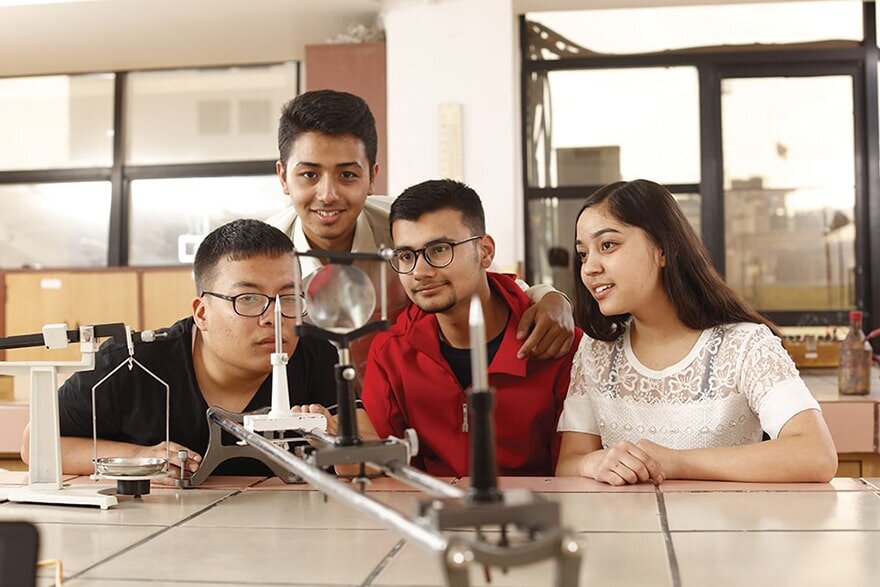Choosing the best Institution for Ten-plus-two Course
Adverts in newspapers, magazines, radio, TV, and graffiti are nowadays the fountain of confusion for college hopefuls that eventually coerce them to reside in limbo and lament in hindsight if they cannot decide on the major aspects of an award-winning education. They are always struck by a question: which college is right for the study in ten-plus-two education? Most colleges claim that they have good facilities and a number of scholarship schemes. In such a condition, students are prone to wrong decisions because of manipulative advertisements and eye-catching hoarding boards. The pursuit of a perfect college can be a frustrating process and making the wrong choice can cost a lot of money and time for desperate students.
‘Students should explore a range of areas in a college that encompasses available facilities, past records, infrastructural development, teaching faculty, management team and fee structure of enrollment’, says Ramesh Kumar Silwal, who is the CEO at GoldenGate Int’l College and President of HISSAN. Mr. Silwal adds, “Students should first understand the difference between newly opened colleges and the established ones in the market’. An established institution has a legacy of results, academic trend, commitment to the society, and so on, which can be observed and evaluated explicitly whereas a new institution may lack all these vital aspects of holistic education. Moreover, Senior Vice president of HISSAN, Yuvraj Sharma says that parents and students should scrupulously observe the colleges and confirm their enrollment since this level is crucial to build their career foundation.
Although the SEE attainment is considered to be an iron gate of one's academic journey, the meaning of the ‘Iron Gate’ has been shifted to ten-plus-two level now. Most SEE students are under direct nourishment of parents and can conquer without problems, but chances of deviation and misguidance are likely to be widespread for plus-two level students. ‘As long as a student fails to make a rational decision for the course and college choice, he or she cannot envisage a pathway for a good career’, says Mr. S.P. Singh, the Chairman of Pentagon Int'l College. Even though every college claims their education impartation is unique and advanced, students themselves should pay a visit to witness available educational resources.
The government has not been able to circumscribe the fee criteria in grades eleven and twelve. So, the college has a monopoly in imposing fees on its pupils. But in comparison to other programs of the same level, such as IB, A-Level, CBSE, IGCSE, and technical Programs, more students choose ten-plus-two course due to its affordability and quality achievements. On average, students have to pay around NPS 50000.00 to 200000.00 for Science; NPR 30000.00 to 200000.00 for Management; NPR 40000.00 to 80000.00 for law, and NPR 20000.00 to 70000.00 for Education and Humanities. Many colleges also offer a wide range of full and partial scholarships to students who secure a high percentage in their SEE examinations and scholarship tests they conduct. The fee varies from college to college.
We need to seek opportunities even in problems because every problem comes with equal or greater opportunity although choosing a good school is a real challenge. In fact, the right selection of college and faculty leads us to the right career path.
The future of each SEE graduate mostly depends on ‘Choice rather than Chance’. Opportunity knocks your door once only, and the next call may be better or worse, but never the same one. That is why it is so crucial to make the right decision at the right time.
Some Tips for Selection of Right Ten-plus-two Schools/ Colleges
Subject Choice:
Students should be clear about the subject they are going to study at ten-plus-two level before giving priority to any particular school. Moreover, their chosen school should allow them to avail of all available resources.
Distance Up to School:
It is better to choose a school nearby as soon as possible. Regular long travel doesn’t give the results we expect. Although educational institution supports each individual student for their study and provides an appealing academic environment, students themselves have to study thoroughly. So, you should have enough time to study.
Students’ Priorities:
Students have to be very clear about their priorities and in accordance with that, they have to choose a school. If a student has an interest in accessing higher education, s/he has to choose the quality of the school. If students have an interest in sports or extracurricular activities, their priority of selection of school should be based on facilitates it offers.
Economic Status:
Fees vary amongst schools due to high competition. The experience shows that parents prioritize the school that imposes a minimal fee structure. But parents should know that the school that offers a nominal fee delivers quality education. So, you should not give priority to cheap ones but should give priority to a school that ensures a good study environment and access to a range of choices in higher education.
The advice of Guardians and Teachers:
In the case of doubt on subject choice and college selection, students have to take support from guardians/parents and teachers which helps them get explicit information to clear any conundrums.
Proper Counseling from Seniors:
If students need more information about the school where they are planning to get enrollment, you can ask some of the previous students of that school. Seniors can give you proper guidance on the strength and mediocrity of the school. Therefore, it can be a good way to select the right school for higher studies.
Parameters for Student Assessment in Higher Education
The significance of securing good marks in examinations is still highly venerated; however, it is not the only assessment factor for recognizing one’s talents and prodigies. We have to consider numerous factors that determine one’s learned prodigies in higher education. So, rather than exam marks, empirical skills in higher education can be one of the factors for the real judgment of a student.








